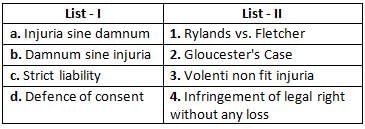Legal Studies: CUET Mock Test - 1 - Humanities/Arts MCQ
30 Questions MCQ Test - Legal Studies: CUET Mock Test - 1
Q Rajiv, an environmentalist, went to Aravalli Hills to sprinkle pesticide on a specific type of tree breeding dangerous bacteria. He was doing so in the afternoon. Bhola, a villager, was fetching wood from the forest. Rajiv was using a pesticide gun. Unfortunately, the pesticide spray reflected off a tree and harmed Bhola. Rajiv was held liable. Decide.
Q. Ajit was drunk and fought with his wife. In anger, he poured petrol on her, set her on fire, and later started extinguishing the fire. He was held under the court of law. Decide.
Q. Abhi, a patient, was under observation by a psychiatrist. Abhi is, at intervals, of sound mind. He killed Ashi during such an interval. Abhi was held liable for the murder. Decide.
Q. Arya, an eleven-year-old girl, had a 15-year-old sibling. Arya had always been a stubborn child. One day, she demanded a toy from her brother. He refused, and in rage, she stabbed him with a knife, badly injuring him. She was held by the court of law. Decide.
Q. Gurjot drank alcohol given by a friend, thinking it to be a cold drink. He became intoxicated and hit a person while driving his car back home. He was held liable for the tort done. Decide.
Who among the following is entitled to legal services?
Assertion (A): The Advocate's Act recognizes only one class of practitioners.
Reason (R): The Advocate's Act abolished all old categories of practitioners.
Consider the following statements regarding NHRC of India. Which of the following is/are incorrect?
A. It is based in Mumbai.
B. Its chairman must be a judge of the Supreme Court (Chief Justice).
C. It is mandatory to appoint a woman as a member of the commission.
Rashid wants to pursue a 5 year integrated BA LLB programme from National Law University, Jodhpur. Which entrance exam will he have to take?
What distinction do senior advocates bear in their uniform?
The National Minorities Commission consists of _____________ members, except the Chairman and the Vice-Chairman.
Identify the correct statements:
(A) The Supreme Court of India was established in 1950.
(B) The Supreme Court has original jurisdiction under Article 131 of the Constitution.
(C) The High Courts have appellate jurisdiction only over criminal cases.
(D) District courts handle civil and criminal cases at the state level.
There were three processes whereby the developing civilization progressively moved towards social engineering through free legal aid. Point the odd one out.
Assertion (A): Lok Adalats have the same powers as are vested in a civil court with respect to certain matters only.
Reason (R): Lok Adalats have been recognized under the Code of Civil Procedure, 1908.
In which of the following can the parties, out of their own free will, appoint (a) neutral person(s) to resolve their disputes?
Which statement is true with respect to jurisdiction in ad hoc arbitrations?
Assertion (A): The Bar Council of India regulates the content, syllabus, and duration of the law degree.
Reason (R): The Bar Council of India was established by Parliament under the Advocates Act, 1961.
Identify the correct statements:
(A) Judicial review in India is only limited to checking legislative actions.
(B) Judicial review is an essential feature of the Indian Constitution.
(C) The power of judicial review is available to both the Supreme Court and High Courts.
(D) Judicial review allows courts to nullify laws passed by the Parliament.
The decisions of the International Court of Justice
Who is the ex officio member of State Bar Councils?
The Universal Declaration of Human Rights was adopted under whose chairmanship?
With regard to Zonal Councils, consider the following statements:
- The Zonal Councils are statutory bodies.
- They are established by an Act of the Parliament, that is, States Reorganisation Act 1956.
- North-Eastern Council was created under the States Reorganisation Act 1956.
Which of the statements given above is/are correct?
The following question consists of four statements, labeled as A, B, C, and D. You are to examine these statements carefully and select the best option for answer.
A. Attorney-General of India is qualified to be appointed as a judge of the high court.
B. Attorney-General represents Government of India in the Supreme Court.
C. Appointment of the Attorney-General is political in nature.
D. Attorney-General is appointed on the basis of professional competence.
Decide correct statement(s):
Any proceedings for removal of a judge of any High Court in India may be initiated only by
The term "intellectual property rights" covers:
A coolie in uniform picks up the luggage of S to be carried out of the railway station without being asked by S, and S does not stop him either. Examine whether the coolie is entitled to receive money from S under the Indian Contract Act, 1872.






















